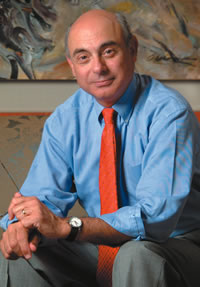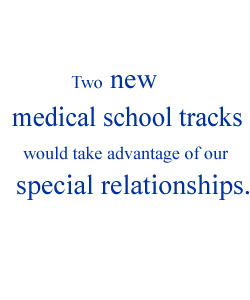
Michael M.E. Johns



In this issue
From the CEO / LettersNo fear
Consummate chemistry
Moving forward
Noteworthy
On Point:
The toughest decision
Last Word:
Your voice counts in tort reform
Inspiration to think beyond boundaries
It all came together as I was listening to Dean Tom Lawley's state-of-the-school address. Before his speech, Tom and I had been talking about the School of Medicine's (SOM) curriculum and how we at Emory might set a new course for the new century. Now, as Tom put up a slide that said the SOM curriculum would be a model for others to follow by 2008, I thought, "Exactly what could we do that would make us so distinctive? What are our unique opportunities?"
Some are obvious. We sit next door to the Centers for Disease Control and Prevention (CDC), the champions and guardians of the public's health, not only for this great nation but also for the world. Their work has never been more important or more in the public eye, and we collaborate extensively in many areas of research and education. We also have a unique and thriving partnership in biomedical engineering with Georgia Tech, one of the best engineering and technical universities in the world. More opportunities are on the drawing board. Here at Emory, we share a campus with a world-class liberal arts college and professional schools of law, theology, and business.
And then I revisited Lee Hood's comments at the dedication of the Winship Cancer Institute and his lecture on systems biology and nanomedicine, and their implications for society and for medical education. Lee, a pioneer in molecular biotechnology and genomics at the California Institute of Technology, challenged us to think about the potential of these new tools and knowledge base and the demand they create for properly prepared physicians and health professionals to move this new science forward. He spoke of developing inexpensive diagnostics and therapeutics that could be applied throughout the world as well as the ethical, legal, and social issues they will raise. That brought to mind a great Emory professor, Bill Foege, who recently received the Hatcher Award from the Rollins School of Public Health. Bill is someone who thinks about the big problems and then goes out and solves them, including wiping smallpox off the face of the earth and significantly reducing guinea worm disease in Africa and Asia.
We need to use our curricula to create future generations of people like Lee and Bill -- people who have the vision, skills, and moral fiber to identify and take leadership in addressing our most challenging health problems. We can build some of this ourselves but also draw on all our schools and our relationships with Tech and the CDC.
So here's an outline of my thinking about one approach to curricular reform: Why not create two new tracks in our medical school (in addition to what we do now) that take advantage of these special relationships? What if we had a program that sought out high school graduates who wanted to pursue the systems biology or the public health track? We could offer a special curriculum over the four undergraduate and four medical school years with perhaps a ninth year that would yield an advanced degree, such as a masters of science in systems biology or a masters of public health. Undergraduates would be guaranteed a medical school position if they maintained academic excellence. There could be mentors from the college experience and the medical school from day one. The faculty would design two curricula. One, focused on math and science (life sciences, physical sciences, and computers), would prepare students to move into systems biology and nanomedicine. The other would concentrate on the humanities and the social, behavioral, and public health sciences. Both tracks would be designed to educate the professional physician-scientist and policy-making leaders of the future.
Rather than treating students as empty vessels learning on the seats of their pants (as we were largely treated in our education), our students would be pulled off their seats as the two tracks interweave and opportunities proliferate for team-based, technology-enhanced, hands-on research and clinical experiences. We would be educating leaders not just for health care and medicine but for society and the world.
We have entered this new century on solid footing. As we look ahead to defining Emory's 21st century aspirations, we must listen to and learn from those whose visions and examples can help us take off and reach new heights.
Michael M. E. Johns
Copyright © Emory University, 2004. All Rights Reserved.
Send comments to the Editors.
Web version by Jaime Henriquez.